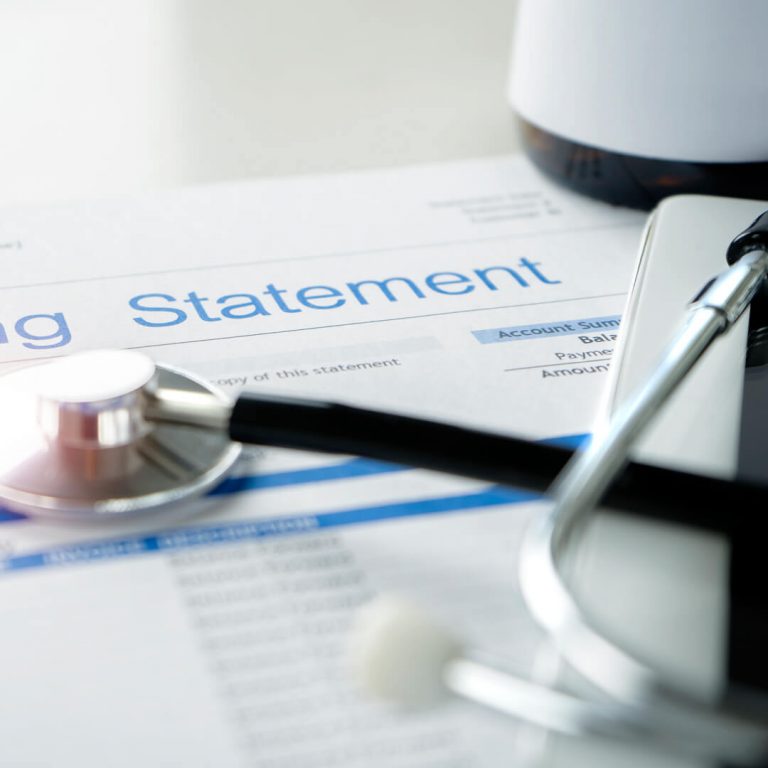You or someone you know has likely faced an astronomical medical bill due to an unexpected health emergency. A recent poll found 64% of U.S. adults are very or somewhat worried about unexpected medical bills. In the same survey, 25% said they had skipped or postponed needed healthcare because of the cost and 41% were dealing with medical debt.
You might think you have no choice but to pay the face amount of a large medical bill, putting yourself in debt for thousands of dollars or otherwise straining your budget to its limits. But there are things you can do to reduce the total amount of a medical bill and creative ways to cover the remaining balance.
1. Understand your insurance coverage.
Everyone’s health insurance coverage is different, and insurance companies can change the details of their plans with each new enrollment period. If you didn’t when you signed up, now is the time to familiarize yourself with your current policy so you understand exactly which treatments and charges are covered and which are not. Also note the amount of your deductible and any co-pays (a set dollar fee you owe for various types of care) or coinsurance (the percentage of the bill you owe after you’ve met your deductible).
Most health insurance providers make the details of their plans available to policyholders in either print or digital form. If you’re not sure where to find this, check with your HR department for an employer-based plan or look at the back of your insurance card to find contact information, such as a website or phone number.
Understanding your insurance coverage before you get sick or need care puts you in a better position to deal with the cost of care.
2. Review every medical bill.
Typically after you receive medical care, you’ll get an Explanation of Benefits (EOB) from your insurance company. This document explains your insurance benefits as it pertains to the bill for your treatment. The EOB typically includes the following information:
- Amount Billed by Provider (The amount the doctor or hospital charged)
- Plan Discounts (A discount negotiated by your insurance company)
- Amount paid by insurance
- Amount owed to the provider from the patient
Most EOBs also include information about your deductible, copay and coinsurance. If a procedure or treatment is not covered, the EOB should include a short explanation about why. Understanding your coverage will help you spot any discrepancies between your policy and what is indicated on an EOB.
The other thing you’ll receive after treatment is the actual bill from the provider. If the bill arrives first, wait for your EOB before you pay anything.
With both documents in hand, review them carefully to make sure they correspond to each other. If there is a discrepancy between the two, it may be a billing error. In that case, ask for an itemized bill, which will provide you with a detailed breakdown of all costs charged to you for services and/or inpatient stays. Even without a discrepancy, you may want to make a habit of always requesting an itemized bill to help you understand your medical costs and to uncover errors.
Specifically regarding hospital stays, it’s important to review each item on your bill carefully to be sure you’re not getting charged for a treatment you didn’t actually receive. According to a report by the U.S. Government Accountability Office, an overwhelming 9 in 10 hospital bills contain errors.
Keep copies of all EOBs, initial bills and itemized bills handy while you determine your best course of action.
3. Dispute all errors.
If there is something on an EOB that you believe is inaccurate, call a company representative to ask about it. Be sure to have the EOB and any other documents related to it, such as the provider’s corresponding bill in front of you when you make the call and note the time of your call, the contents of the conversation and the name of the representative you speak to in case you need it for future reference.
If there is an error on the bill from your healthcare provider, ask to speak to a representative of the billing office and calmly explain your position. Here, too, keep a careful record of the conversation for future reference.
In both cases, be prepared to make multiple phone calls until you reach a party who can affect change. It’s also a good idea to follow up with a written request to challenge a charge.
4. Research typical costs for care.
Ideally, you want to research the typical cost of any needed procedure or surgery before you schedule it. Per the federal Hospital Price Transparency Rule effective since January 2021, hospitals are required to provide consumers like you with a clear and accessible price list for all their services. This lets you compare the price lists of all providers covered under your health insurance policy so you can choose accordingly.
Of course, emergency medical events happen, which can make prior research impossible. In that case, research the going rate of coverage after the fact through sites like HealthcareBluebook.com, HealthcarePriceTool and Fair Health to see if a charge for a procedure has been unreasonably inflated.
Keep thorough records of all your research.
5. Appeal insurance coverage denials.
Don’t take no for an answer. If your insurance provider, Medicare or Medicaid denies coverage that you believe your policy entitles you to, file an appeal. Make sure to let your healthcare provider know about your appeal because they will often assist you in your efforts by providing additional documentation, such as a clarification or a correction of a billing code, to your insurance company or explaining why the procedure was medically necessary.
6. Negotiate the remaining bill’s total.
If an anticipated bill is more than you think you’ll be able to afford or an actual bill is unmanageably high after all errors have been corrected, it’s time to negotiate with your provider’s billing office for a lower price on the treatments and procedures planned or rendered. The best time to negotiate is before undergoing a procedure. If that isn’t possible, then begin negotiating as soon as you receive the bill.
Most practices allow you to schedule an appointment with a representative of the billing office. Bring all your bills and other supportive documents, such as receipts from the pharmacy, information from your insurance provider and the results of your research about the going rate for the care you need or had.
At the meeting, explain that the anticipated or actual bill will cause you financial difficulty and that you’re looking for a way to lower the costs. By law, nonprofit hospitals must provide financial assistance programs, and many for-profit providers are also willing to help consumers who are struggling to pay their bill. Here are some open-ended questions to guide your negotiations in a polite but assertive way:
- What discounts do you offer for financial hardships?
- Are there any fees your office is willing to waive?
- I know many hospitals have charity relief plans for patients having difficulty meeting their payments. Can you tell me about yours?
- Can you charge me what Medicare would pay for this service?
- Can you lower some charges if I pay this off sooner?
With luck, you’ll walk away with a discounted bill.
7. Create a payment plan or seek funding.
Once you have your final bill amount, you’ll need to choose to pay it now or work on creating a payment plan. Spreading a large bill over several months or years will make it more manageable.
If you’d rather not have this huge bill hanging over your head for a while, or your provider insists on immediate payment, consider other options. If you’re a homeowner, you can open a This will allow you to tap into your home’s equity to pay your bills.
8. Know when to hire a medical billing advocate.
A medical billing advocate is someone you hire to help you manage your healthcare bills, such as finding and disputing errors for you, appealing coverage denials and negotiating the cost of your bills. They’re typically paid by the hour or as a percentage of the bill reduction they achieve. This option makes the most sense when you’re dealing with the following:
- A large number of medical bills or a large dollar total of outstanding bills
- A chronic or otherwise serious medical condition that requires a lot of medical care and/or leaves you with limited time or energy to deal with the corresponding bills
- A dispute between your insurance company and your medical provider
- A lot of medical bills for a loved one for whom you’re responsible
9. Beware of medical debt collection agencies.
If you receive a call from someone claiming to be from a collection agency regarding an unpaid medical bill, don’t be bullied into revealing any personal information or paying anything on the spot because they could be a scammer or there could be an error with the supposed debt. Here’s what to do instead:
- Gather the caller’s name, contact information, the agency they represent and the provider whose bill they are trying to collect. Scammers typically can’t or won’t provide this information.
- Ask them to provide you with a debt collection validation notice, which they are required by law to do.
- You have 30 days from the receipt of this validation to dispute the debt. Use that time to determine if the debt is actually yours by calling the healthcare provider to confirm the bill and your insurance company to determine if it has been processed.
- If you discover that the debt is not yours or there is some other error with it, such as the amount, send a written dispute outlining all your facts via certified mail to the debt collection agency.
10. Know about your patient legal rights and patient advocacy organizations.
Speaking of collection agencies, per the Fair Debt Collections Practices Act and the Debt Collection Rule, they aren’t allowed to harass, coerce, threaten or deceive you into paying a medical bill. These laws limit when a debt collector can contact you (only between 8 a.m. and 9 p.m. unless you give them permission outside of this window), as well as how often they can contact you within a week or once they’ve reached you.
Moreover, they aren’t allowed to report an unpaid medical bill to a credit reporting bureau (Experian, Equifax or Transunion) until after they have attempted to get it paid for 12 months. If they violate any of these rights, , you should report that by filing a complaint with the Consumer Financial Protection Bureau.
As for the credit reporting bureaus, they no longer include unpaid medical bills under $500 or paid medical debt on your credit report, the latter of which used to remain on your credit report for seven years.
Additionally, the No Surprises Act, which went into effect at the beginning of 2022, protects you from surprise medical bills related to emergency room visits at out-of-network providers, as well as non-emergency care received at an in-network facility, like a hospital, but that includes care from an out-of-network provider like an anesthesiologist. The gist of this law is to limit your out-of-pocket payments for out-of-network care to what you would pay for in-network care. Be careful of signing any notice and consent forms related to out-of-network care as they can nullify your protection under the No Surprises Act.
The following resources can help you when dealing with a large medical bill or medical debt collection agency:
- CMS.gov No Surprises Help Desk at 800-985-3059
- The Consumer Financial Protection Bureau at 855-411-2372
- The Patient Advocate Foundation at 800-532-5274
11. Document everything.
Whether you’re disputing a billing error or negotiating a lower price on a bill, don’t rely on your memory. Instead, keep a detailed record of every conversation with your provider, insurance company and anyone else you speak to in regard to a bill. Note the name of the person you spoke to, who they represent, their phone number, the date and time of the call, key points of the discussion and next steps for you, them or someone else.
12. Consider switching plans.
To avoid an unexpectedly large medical bill in the future, consider switching your insurance plan to one that provides more robust coverage and less expensive copays and deductibles. Your premiums will likely increase, but the change may be financially worthwhile if you have ongoing medical expenses that have been overwhelming you.






Comments Section
Please note: Comments are not monitored for member servicing inquiries and will not be published. If you have a question or comment about a Quorum product or account, please visit quorumfcu.org to submit a query with our Member Service Team. Thank you.